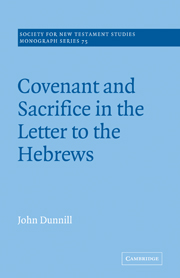Book contents
- Frontmatter
- Contents
- Preface
- List of abbreviations
- A NOTE ON TRANSLATIONS
- Introduction: Hebrews and historical criticism
- Part I Sociology
- 1 The new covenant community
- Part II Structuralism
- Part III Renewing the covenant
- Conclusion
- Bibliography
- Index of passages quoted
- Index of modern authors
- Subject index
1 - The new covenant community
Published online by Cambridge University Press: 07 January 2010
- Frontmatter
- Contents
- Preface
- List of abbreviations
- A NOTE ON TRANSLATIONS
- Introduction: Hebrews and historical criticism
- Part I Sociology
- 1 The new covenant community
- Part II Structuralism
- Part III Renewing the covenant
- Conclusion
- Bibliography
- Index of passages quoted
- Index of modern authors
- Subject index
Summary
Since the inception of the form-critical movement, twentieth-century scholarship has been insisting that New Testament literature cannot be understood in isolation from the Christian communities in which it took shape, although it is unfortunate that the complexity of the social history of the first-century Roman world, and the obscurity of the church's origins, have largely prevented this claim from being realised. As regards Hebrews, the primacy of this presupposition has contributed greatly to its current neglect and misreading, and on this account, too, the composition of the gospels has sometimes been tied, by way of explanation, to a few stereotyped life-situations so broad (‘apologetic’; ‘preaching’) as to give less specificity, not more, to our picture of the origins of the material. But the social description of first-century Christianity is a field in which genuine advance has been made, and most recently, with the increasing application of sociological procedures to the sparse historical data, reconstructions of the earliest worshipping communities have begun to emerge that are substantial enough, at last, to bear the weight of theological interpretation.
Making use of these procedures, then, this chapter is offered as an essay in sociological interpretation. As such it is complementary to the main argument of the book, with rather different aims and methods, but it shares its synchronic, intratextual perspective. The more overtly historical nature of the material, especially pages 22–9, and the hypothesis advanced there, do not constitute this an ‘historical introduction’.
- Type
- Chapter
- Information
- Covenant and Sacrifice in the Letter to the Hebrews , pp. 13 - 40Publisher: Cambridge University PressPrint publication year: 1993

